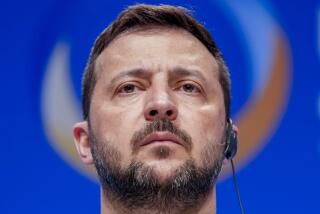EUROPE ON THE ROAD TO UNITY : NEWS ANALYSIS : Germany Has Yet to Make Its Mark as Europe’s Leader
- Share via
WASHINGTON — Ever since the fall of the Berlin Wall, the world has been waiting for Germany to emerge as a true superpower, an international leader that could command a newly unified Europe in the economic and political competition that was sure to develop in the 1990s with the United States and Japan.
The continuing financial crisis in Europe has provided one of the first major tests of Germany’s ability to assume that mantle of global leader. So far, Germany has flunked.
Indeed, the chaos in Europe’s currency markets can be traced to the refusal of German leaders to put the good of Europe before the domestic political and economic needs of Germany.
With its policies focused almost entirely on its domestic problems, Germany stubbornly refused to offer more than a token reduction in its sky-high interest rates--a move that most analysts believe is essential to help rebuild the Continentwide currency system that now lies in tatters.
Germany again held its ground over the weekend in the face of mounting international pressures brought to bear by the United States and other nations in a crisis meeting of the Group of Seven major industrialized powers here in Washington.
Even President Bush intervened, meeting with finance ministers from Europe and elsewhere Sunday night to urge them to accept policies aimed at stimulating world growth and strengthening international economic coordination. Still, Bush apparently got no new commitments from the Germans to change their hawkish policies.
“Making Germany work is clearly the first priority of German leaders, and they seem quite prepared to let their neighbors deal with the consequences,” observed Allen Stoga, an international economist with Kissinger Associates. “I think it is fair to say that the Germans are not doing a particularly good job of recognizing their responsibilities to the global economy.”
The German policy of looking out for its own interests is reopening old wounds in Europe, where an older generation that still remembers World War II has never adjusted to the idea of a resurgent Germany astride the middle of the Continent.
German leaders, beleaguered by criticism of their handling of the crisis, stressed that Sunday’s French approval of a critical referendum on European unity is a sign that their vision of a German-led united Europe could still be salvaged.
German Finance Minister Theo Waigel said France’s vote was “a step on the way to Europe.”
Still, the extremely narrow margin of victory in the French referendum seemed to underscore the extent to which last week’s financial crisis sowed doubts throughout the Continent about German leadership.
Until recently, many leaders in other European nations were happy to follow the lead of the Germans when it came to economic affairs.
That worked well until German unification forced Germany to abandon its own budget discipline to pour hundreds of billions of dollars into the rebuilding of eastern Germany. Germany had a choice: pay for the spending with higher taxes or let the bulging deficit be financed through higher interest rates. German leaders chose higher interest rates as the path of least political resistance at home. By doing so, Germany effectively spread the pain of unification beyond its own borders to the rest of Europe.
Higher German interest rates sent the value of the mark, which is tied to other European currencies in a fixed exchange rate system, soaring to record heights. That put pressure on every other currency and meant that weaker nations had to take painful economic steps to match German policies or pull out of the European financial system entirely.
Even today, Germany still seems to be refusing to offer its neighbors an alternative way out.
“I think it’s fair to say that if German policies had been less oriented toward their domestic problems, we would have seen greater stability in the (currency) system,” observed John Lipsky, chief economist at Salomon Brothers in New York.
Now Germany’s reluctance to lead Europe out of crisis raises new doubts about the idea that it can rise to the challenge of international statesmanship, which often demands compromise.
“The Germans should have adjusted their policies long before we got the crisis stage,” Stoga said. “They don’t seem to have a sense of global strategy.”
Times staff writer Douglas Jehl contributed to this story.
More to Read
Sign up for Essential California
The most important California stories and recommendations in your inbox every morning.
You may occasionally receive promotional content from the Los Angeles Times.













